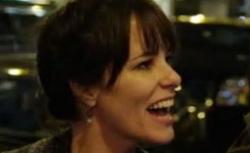Summer is traditionally a down time for television, the long, awkward stretch between the end of one network season and the not-yet-dashed hope of the fall lineup. But it’s also a moment when more daring or unusual shows can get a shot. With a shorter run and the expectation that fewer viewers will be tuning in, networks can feel free to experiment with new formats or tones, and quirky characters like those that have defined the USA Network. And that sense of adventure can also extend to new kinds of female characters, women who are too ambitious, or weird, or bluntly political for networks to take a chance on during the traditional season. Here are five of my favorite women of this summer’s television (who, by the way, I’d love to see more of during the regular season):
Michelle Sims, Bunheads: Amy Sherman-Palladino’s ABC Family show about a dance school in California is strange in a lot of ways. It’s not particularly linear, it’s a geek reference-fest, and perhaps most startlingly, it portrays a world where men are decidedly on the margins. But the most unusual thing about it may be its main character, Michelle, a Vegas dancer played by Sutton Foster who decides, on a whim, to marry a regular at her show and move to California with him, and then to stay after he dies in a car accident. Michelle is pathologically awkward, terrified of her own talents, and a self-sabotager of epic proportions. The show’s accomplishment is that Michelle can be all of these things, and still be worthy of respect and love. Like Girls, Bunheads is a compelling exploration of the terror of pulling yourself together.
Sabrina Taylor, The L.A. Complex: The L.A. Complex is that rarest of show-business dramas—a story about trying to make it in L.A. that recognizes that things like race and class and gender and homophobia actually influence people’s chances. An up-and-coming comedian, Sabrina has a one-night stand with Nick, who steals her material, and then finds herself competing with him for a job in the writers’ room of a late-night show. The L.A. Complex is brutally honest about the fact that Sabrina’s gender, as well as her unwillingness to pony up for strippers for their potential boss, is a major obstacle to her getting the gig. And the C.W. show lets her be a tough competitor without ever labeling her a bitch.
Susan Berg, Political Animals: Speaking of competitiveness, this USA miniseries had Sigourney Weaver as Hillary Clinton duking it out with Carla Gugino as Berg, a Maureen Dowd stand-in. Gugino’s lovely, sexy performance got at the damage women do each other, the compromises powerful women make when they don’t have enough time to dedicate to their personal lives, and the triage reporters can end up performing on behalf of sources that they like and admire just a little bit too much. In a television world full of girls, Berg is a rare creature—an actual grown woman.
Liz, Louie: It almost feels unfair to include anything Louie-related on this list given how dedicated the FX sitcom is to innovation on everything from continuity to music. But as Liz, Louie’s date from the bookstore where he shops for his daughter, Parker Posey was magnetic, sexy, and genuinely damaged beyond the conventional television notion of what constitutes problems. Louie normally only shambles just beyond his comfort zone, but Liz yanked him out of it, getting him to try on dresses and climb to New York rooftops. I’m not sure I’d want to go out with Liz, but I love having her on television as an entirely different kind of femme fatale.
Sloan Sabbith, The Newsroom: My distaste for Aaron Sorkin’s portrait of cable news is well-documented, but watching it did get me to do something I hadn’t considered possible: like Olivia Munn. She plays economics reporter Sloan as basically a heterosexual Rachel Maddow, but skittish and awkward. She’s the voice of female reason on the show, dedicated to discussing numbers when her producer MacKenzie is freaking out about a four-years-dead relationship. She bluntly confronts the challenges of making cable news edifying in the finale when she finds out that all of her reporting on the debt ceiling hasn’t changed public perception of the issue in the slightest. And the episode where she violated journalistic ethics to try to get a Japanese corporate executive to admit how dangerously high levels of radiation at a nuclear power plant had become in the wake of a devastating earthquake and was punished for it was one of the show’s most genuinely interesting explorations of the limitations and frustrations of reporting. Plus it gave Sloan a chance to call out the condescending, old-school sexism of her boss, Charlie Skinner. If only The Newsroom was a story about Sloan trying to make a truly different kind of news program.
